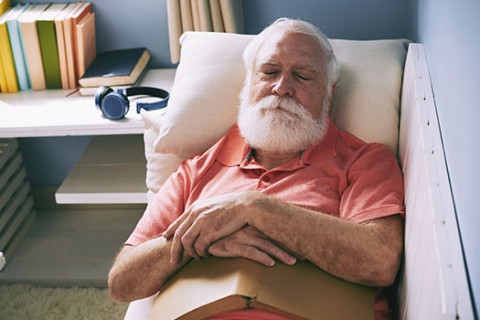As we get older, we can experience some changes in our sleeping patterns, this is totally normal. You may notice things like becoming sleepy earlier, waking up earlier, or simply getting less deep sleep. However, it’s important to know that disturbed sleep, waking up tired every day, and other symptoms of insomnia are not a normal part of aging.
Sleep is just as key to your physical and emotional health as it was when you were younger so it’s important that you get your rest. A good night’s sleep improves your concentration and memory, it allows your body to repair any cell damage that occurred during the day, and refreshes your immune system, all this, of course, helps to prevent disease.
Older adults who don’t sleep well are more likely to suffer from depression, attention and memory problems, excessive daytime sleepiness, plus it can put them at greater risk of falls.
How much sleep do seniors need?
Sleep requirements can slightly vary from person to person, but most healthy adults require 7 to 9 hours of sleep every night. However, how you feel in the morning is more important than a specific number of hours. If you are waking up not feeling rested or feeling tired during the day this is a pretty good indication that you’re not getting enough sleep and you’ll need to change your bedtime habit or go to sleep earlier each night.
Tips to improve your quality of sleep
To improve your quality of sleep it’s important to understand the underlying causes of your sleep problems. The following tips can help you identify and overcome some age-related sleep problems, get a good night’s rest, and improve the quality of your waking life.
Sleep Changes
As you age your body produces less melatonin, meaning you may experience more fragmented sleep and wake up more often during the night. Many seniors consider themselves as “light sleepers”.
You may:
- Want to go to sleep earlier in the evening and wake up earlier in the morning.
- Have to spend longer in bed at night to get the hours of sleep you need, or begin taking a nap during the day.
Identify causes for your insomnia
Many cases of insomnia or sleep difficulties are caused by underlying but very treatable causes. Identifying all possible causes will go a long way in treating the issue. Be sure to talk to your healthcare team if you think any of these could be the reason you’re not sleeping properly.
- Are you under a lot of stress?
- Are you depressed? Do you feel emotionally flat or hopeless?
- Do you struggle with chronic anxiety or worry?
- Have you recently gone through a traumatic experience?
- Are you taking any medications that might be affecting your sleep?
- Do you have any health problems that may interfere with sleep?
Common causes of sleep problems
Poor sleep habits & sleep environment
These can include irregular sleep hours, consumption of alcohol before bedtime, and falling asleep with the TV on.
What to do? Make sure your room is comfortable, dark, and quiet, and your bedtime rituals are conducive to sleep.
Pain or medical conditions
Health conditions such as a frequent need to urinate, pain, arthritis, asthma, diabetes, osteoporosis, nighttime heartburn, and Alzheimer’s disease can interfere with sleep.
What to do?
Talk to your doctor to address any medical issues.
Medications
Your medications, some combinations, as well as their side effects, can affect sleep.
What to do? Talk to your doctor they may be able to make changes to your medications or medication schedule to help improve sleep.
Lack of exercise
If you don’t move around much, you may notice you never really feel very sleepy or may even feel sleepy all the time.
What to do? Be sure to get enough physical activity during the day. Regular exercise during the day can help you get a good sleep.
Stress
Big life changes like retirement, the death of a loved one, or moving from a family home can cause stress.
What to do? Nothing improves your mood better than finding someone you can talk to face-to-face.
Little social engagement
Believe it or not social activities, family, and friends can help you get a good night’s sleep. If you’re not being socially engaged enough you may find it you’re not tired and getting to sleep can be tougher.
What to do? Reach out to family and friends regularly, try volunteering, joining a seniors’ group, or taking an adult education class. Also, contact CANES to see how we can help.
Sleep disorders
Restless Legs Syndrome (RLS) and sleep-disordered breathing—such as snoring and sleep apnea—occur more frequently in older adults.
What to do? If you’re noticing you're not tired during the day and suspect you’re not sleeping well talk to your doctor they will help you get to the bottom of the issue and help find solutions to any sleep disorders you may be struggling with.
Lack of sunlight
Bright sunlight helps regulate melatonin and your sleep-wake cycles. So if you’re not getting enough sunlight you could be missing out on some very important hours of sleep.
What to do? Try to get at least two hours of sunlight a day. Keep shades open during the day or use a light therapy box.
When to talk to a doctor about sleep problems
If your attempts to solve your sleep problems are not working, keep a sleep diary for a few days and take it to your doctor. Be sure to write down when you use alcohol, caffeine, and nicotine, and keep track of your medications, exercise, lifestyle changes, and recent stresses. Your doctor may refer you to a sleep specialist or cognitive behavioural therapist for further treatment, especially if insomnia is having an effect on your mood and health.

